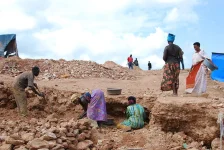According to researchers from Makerere University, half of young women working at mining sites caught a sexually transmitted infection last year. The team talked with 810 people at gold mines across Kassanda, Mubende, Busia, and Namayingo areas. Professor Betty Kwagala headed up this project, which examined health and money problems for people living in small mining camps. They checked how these communities lived before and after COVID-19 hit the country.
The research team found many health issues beyond just STIs. Several women suffered from health problems because they touched mercury at work. COVID-19 made life harder for young women, who then took more risks with their safety. About 28 percent of women said they had sex with different partners during the past year.
Mining areas see lots of sex abuse, according to Dr. Stephen Ojambo Wandera, who teaches at Makerere University. Girls forced into these areas often become pregnant as teenagers or catch HIV. Rules exist to keep them safe, but nobody knows about them or makes sure people follow them. Dr. Wandera wants stronger rules that keep kids away from mines and protect female miners from sexual abuse.
Around 40,000 women work in small mining operations across Uganda. The real number might be higher since people move between different mines when they hear about job chances. Fred Ngabirano works for the government as commissioner for Children and Youth Affairs. He said these problems have existed for many years. Ngabirano believes people need to change how they think to fix things completely. As part of their work, the researchers taught basic business skills and gave money to start small businesses, hoping better income might solve some problems.
The research team found many health issues beyond just STIs. Several women suffered from health problems because they touched mercury at work. COVID-19 made life harder for young women, who then took more risks with their safety. About 28 percent of women said they had sex with different partners during the past year.
Mining areas see lots of sex abuse, according to Dr. Stephen Ojambo Wandera, who teaches at Makerere University. Girls forced into these areas often become pregnant as teenagers or catch HIV. Rules exist to keep them safe, but nobody knows about them or makes sure people follow them. Dr. Wandera wants stronger rules that keep kids away from mines and protect female miners from sexual abuse.
Around 40,000 women work in small mining operations across Uganda. The real number might be higher since people move between different mines when they hear about job chances. Fred Ngabirano works for the government as commissioner for Children and Youth Affairs. He said these problems have existed for many years. Ngabirano believes people need to change how they think to fix things completely. As part of their work, the researchers taught basic business skills and gave money to start small businesses, hoping better income might solve some problems.












